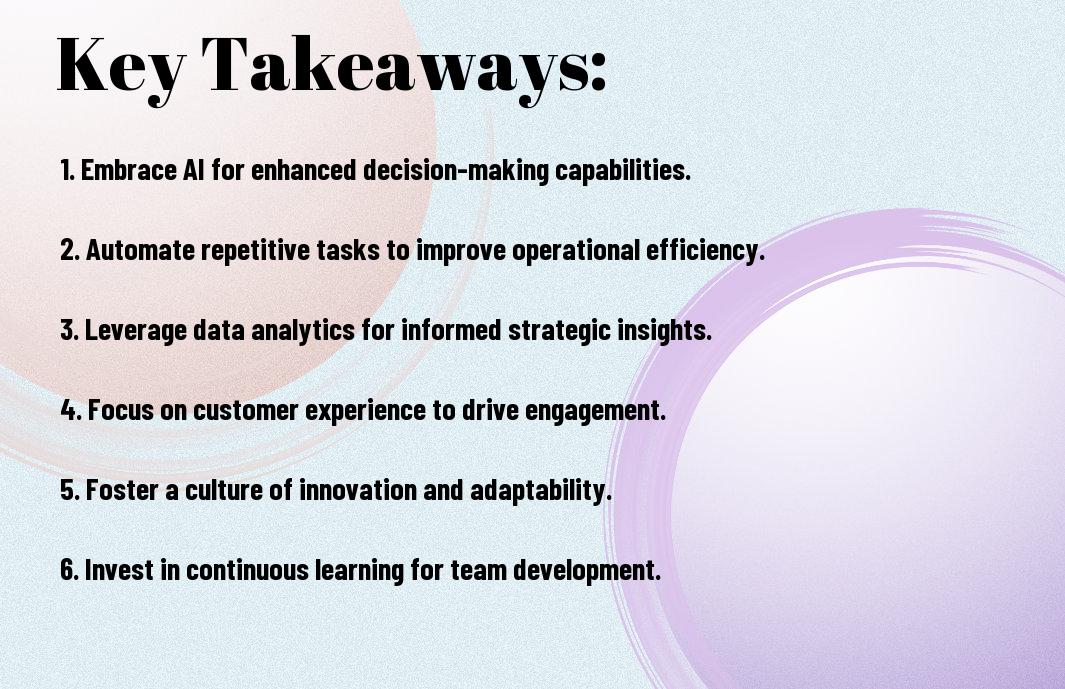As you navigate the ever-evolving landscape of modern entrepreneurship, you’re likely aware of the profound impact artificial intelligence (AI) can have on your business. You’re considering how to harness its power to drive growth, enhance efficiency, and stay competitive. Your ability to adapt and innovate will be key to unlocking AI’s full potential, and this post will guide you through the process, providing valuable insights and lessons to help you transform your business and thrive in an AI-driven world.
Key Takeaways:
- Embracing AI technology can significantly enhance business operations, leading to increased efficiency and productivity, and ultimately driving growth and competitiveness in the market.
- Successful AI integration requires a deep understanding of the technology and its potential applications, as well as a willingness to experiment and innovate in order to stay ahead of the curve.
- AI can be used to automate routine tasks, freeing up human resources for more strategic and creative work, and enabling businesses to focus on high-value activities that drive innovation and revenue.
- Effective AI adoption also depends on the ability to manage and analyze large amounts of data, and to use insights gained from this data to inform business decisions and drive strategy.
- By leveraging AI, entrepreneurs can create new business models, products, and services that meet evolving customer needs and preferences, and establish a strong foundation for long-term success and sustainability.

The AI Revolution in Business
While embracing AI, you can revolutionize your business operations, enhancing efficiency and decision-making. AI-driven technologies help you streamline processes, analyze data, and gain valuable insights, ultimately driving growth and innovation in your organization.
The Tipping Point for AI Adoption
Besides the numerous benefits, you are likely considering the optimal time to integrate AI into your business. As AI technologies continue to advance, you will find more opportunities to leverage them, making now the perfect moment to start exploring their potential.
Small Changes, Big Results
Alongside other strategies, you can begin by implementing minor AI-powered adjustments to your daily operations. By doing so, you will be able to experience the positive impact of AI on your business without overwhelming your systems or staff.
This approach allows you to test and refine your AI integration, identifying areas where AI can have the most significant effect, and making data-driven decisions to drive further improvements, ultimately leading to significant benefits for your business, such as increased productivity, enhanced customer experience, and improved competitiveness in the market, all resulting from your thoughtful and incremental adoption of AI solutions.
Identifying AI Opportunities
Clearly, to transform your business with AI, you need to identify areas where AI can bring the most value. You must assess your operations, looking for tasks that are repetitive, time-consuming, or prone to human error, as these are prime candidates for AI integration.
Data as Your Business Compass
On the path to AI adoption, your data will serve as a guiding light, helping you understand where AI can be most effectively applied. You will use your data to pinpoint inefficiencies and opportunities for improvement, allowing you to make informed decisions about where to focus your AI efforts.
Automation Sweet Spots
For your business to reap the benefits of AI, you need to find the automation sweet spots – areas where automation can significantly enhance efficiency and productivity. You will look for tasks that are not only repetitive but also high-volume, as these will yield the greatest returns on your AI investment.
Understanding how to identify these automation sweet spots is key to successfully integrating AI into your business. You will need to analyze your workflows, looking for bottlenecks and areas where manual processing is holding you back, and then apply AI solutions to streamline these processes, freeing up your resources for more strategic and creative work, and ultimately driving your business forward with increased efficiency and innovation.

Implementation Strategies
To successfully integrate AI into your business, you need to develop a comprehensive plan, considering your goals, resources, and potential challenges. This involves assessing your current infrastructure, identifying areas where AI can add value, and creating a roadmap for implementation.
The Minimal Viable AI Approach
Vital to your AI strategy is starting small, testing, and iterating to ensure you’re on the right track. You’ll want to focus on a specific problem or process where AI can have the most impact, and then scale up as you gather more insights and confidence in the technology.
Building Your AI Team
Modest beginnings are often the best approach when assembling your AI team. You’ll need to bring together individuals with diverse skill sets, including data scientists, engineers, and domain experts, to ensure your AI solutions are effective and aligned with your business objectives.
Implementation of an AI team requires careful consideration of your organization’s structure and culture. As you build your team, you’ll need to provide ongoing training and support to help your staff develop the skills they need to work effectively with AI systems, and to ensure that your AI strategy is integrated into every aspect of your business, driving innovation and growth.
Customer Experience Transformation
Your business can greatly benefit from AI-driven customer experience transformation, enabling you to deliver personalized and efficient services to your clients, ultimately leading to increased customer satisfaction and loyalty.
Personalization at Scale
With advanced AI technologies, you can now offer tailored experiences to your customers, analyzing their behavior and preferences to provide them with relevant offers and services, thus enhancing their overall experience with your brand.
Predictive Service Models
After implementing AI-powered predictive models, you can anticipate and address customer needs proactively, reducing wait times and improving response rates, which can significantly boost your customer satisfaction ratings and retention.
At the heart of predictive service models lies the ability to analyze vast amounts of customer data, allowing you to identify patterns and trends that inform your decision-making, enabling you to provide your customers with timely and effective support, and ultimately driving business growth and success, as you continue to meet and exceed their evolving expectations.
Operational Excellence Through AI
Once again, you can leverage AI to streamline your business operations, enhancing efficiency and productivity. By implementing AI-powered tools, you can automate routine tasks, analyze data, and make informed decisions to drive growth.
Supply Chain Intelligence
Exemplary performance in supply chain management is achievable with AI. You can use AI-driven analytics to forecast demand, manage inventory, and optimize logistics, resulting in improved delivery times and reduced costs.
Resource Optimization
Along with AI, you can optimize your resources, allocating them more effectively to maximize output. You can use AI to identify areas of waste, predict maintenance needs, and improve overall resource utilization.
Indeed, optimizing your resources with AI can have a significant impact on your bottom line. You can expect to see reduced waste, improved productivity, and increased efficiency, allowing you to allocate resources to more strategic initiatives and drive business growth. By leveraging AI in this way, you can stay ahead of the competition and achieve your business goals.
Ethical Considerations
Despite the numerous benefits of AI, you must consider the ethical implications of its integration into your business, as you can learn more about How will AI shape the future of entrepreneurship? and make informed decisions.
Transparency in AI Systems
Transparently, you need to understand how AI systems work and make decisions, ensuring that your business operates fairly and without bias, as you implement AI solutions.
Privacy and Trust Building
Against the backdrop of increasing AI adoption, you should prioritize building trust with your customers by protecting their data and being transparent about your AI-driven processes.
Trust is imperative in establishing a strong relationship with your customers, and as you implement AI in your business, you must ensure that their privacy is respected and their data is secure, fostering a trustworthy environment for your business to thrive.
Final Words
With these considerations, you now have a solid foundation to transform your business with AI. You can leverage AI to drive innovation, enhance efficiency, and stay competitive. As you begin on this journey, your ability to adapt and evolve will be key to success. By applying the lessons in modern entrepreneurship, you will be well-equipped to harness the power of AI and take your business to the next level, achieving your goals and realizing your vision.
FAQ
Q: What are the key benefits of integrating Artificial Intelligence (AI) into my business operations?
A: Integrating AI into your business can significantly enhance efficiency, reduce operational costs, and improve decision-making processes. AI technologies such as machine learning and natural language processing can automate routine tasks, analyze large datasets to provide actionable insights, and personalize customer interactions. By leveraging these capabilities, businesses can innovate their products and services, stay competitive in the market, and achieve sustainable growth.
Q: How can entrepreneurs ensure that their AI-driven business strategies are aligned with ethical standards and social responsibility?
A: Ensuring that AI-driven business strategies are ethically sound involves several steps. Firstly, entrepreneurs should prioritize transparency in how AI is used, including clear communication about data collection and usage. Secondly, they must implement robust data protection measures to safeguard customer privacy. Additionally, businesses should adopt principles of fairness and accountability in AI decision-making processes to prevent bias and discrimination. Engaging in ongoing dialogue with stakeholders, including consumers, regulators, and ethical experts, can also provide valuable insights into maintaining ethical standards in AI integration.
Q: What skills and knowledge do entrepreneurs need to acquire to successfully transform their businesses with AI and thrive in modern entrepreneurship?
A: To successfully transform their businesses with AI, entrepreneurs need to develop a combination of technical, business, and soft skills. Technically, they should have a basic understanding of AI concepts, including machine learning, deep learning, and data analytics. From a business perspective, they need to be able to identify areas where AI can add value, develop strategies for AI adoption, and manage the change process within their organization. Soft skills such as leadership, creativity, and the ability to collaborate with AI experts are also necessary. Furthermore, staying updated with the latest AI trends, best practices, and regulatory environments through continuous learning is vital for making informed decisions and navigating the challenges of AI adoption.



